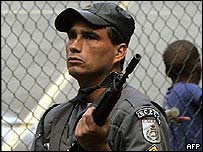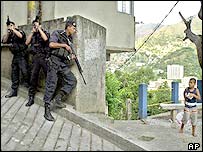Entered into the database on Thursday, November 24th, 2005 @ 12:42:31 MST
Hundreds, possibly thousands of people are shot by police every year
in Brazil, a BBC investigation has found. The authorities say it is mainly criminals caught in military-style
raids on drug gangs but according to a former senior official, new evidence
suggests that many of the shootings are cold-blooded executions conducted by
the police. Former police ombudsman Professor Julita Lemgruber has told BBC World Service's
Assignment programme that, in the state of Rio alone, the police killed 983
people last year. The figure is similar for Sao Paulo. "The federal government should be challenging the various state governments
in Brazil about the hundreds of people that the police kill in this country,"
she says. Victims As a former ombudsman, Professor Lemgruber was responsible for investigating
the police as part of a previous crack down on corruption. In the past five years, the number of fatal police shootings has more than
doubled. Based on her experience as a government official, Professor Lemgruber
says she believes the police are free to act with impunity. "You couldn't really investigate complaints because you knew there was this
curtain of silence that was always present," she says. She adds that she had personally dealt with cases in which summary executions
had happened. The authorities in Rio dismiss these allegations. They say most people killed
by the police are criminals, shot in military-style raids. But in the spring of this year events took a sinister turn when, on 31 March,
two men entered a bar and started shooting, not once or twice, but again and
again. Most of the victims were shot at close range - in the chest and in the
head. In all, 29 people were shot dead, apparently not by members of a criminal drug
gang - but by off-duty police officers. Executions A former military policeman, Gordinho (not his real name), says executions
by police death squads are common. "Everyone knows the police here in Rio de Janeiro... nearly all of them
abuse their authority," he says. "When you get excited you feel you are the law... The shooting cases you
hear about, most of them are executions. "It's all premeditated - very cold-blooded and calculated." After the killings in March, Marcello Itagebah, Secretary of State for Public
Security and the man ultimately responsible for policing in Rio, promised to
take a "meat cleaver" to police corruption. Following the investigation,
11 police officers were arrested. "That shows to the people that we can conduct a very good investigation
and that we can arrest police officers that committed crime," he said.
"We already have arrested more than 500 police officers, and we have expelled
about 200 since last February. That is a job that has to be done every day."
But executions by death squads appear to be a traditional feature of Rio policing.
While the authorities no longer give them official backing, evidence from the
city morgues suggests they continue. "Around 60% of the bodies of people that were killed by the police had
more than six shots," explains Professor Lemgruber. "Most of them [were shot] in the head and in the back - mostly executions."
Brazil is a deeply religious nation. Leaders of the Catholic Church have spoken
out against corruption in politics and in the police force. And among the congregations in the favelas, there is growing anger. They are
determined to fight for change. "You see children playing in the streets, and the people all happy - but
when the cops come here - pop pop pop - some people are killed," says one
resident, Paolo Cesar. "They kill everybody. They got bad cops - bad cops." Another resident insists that "we are fighting really hard for justice
because the guilty people have to pay". The crucial test now for Brazil's politicians is whether they have the will
and ability to overturn a longstanding and lethal police culture of justice
by bullet.

